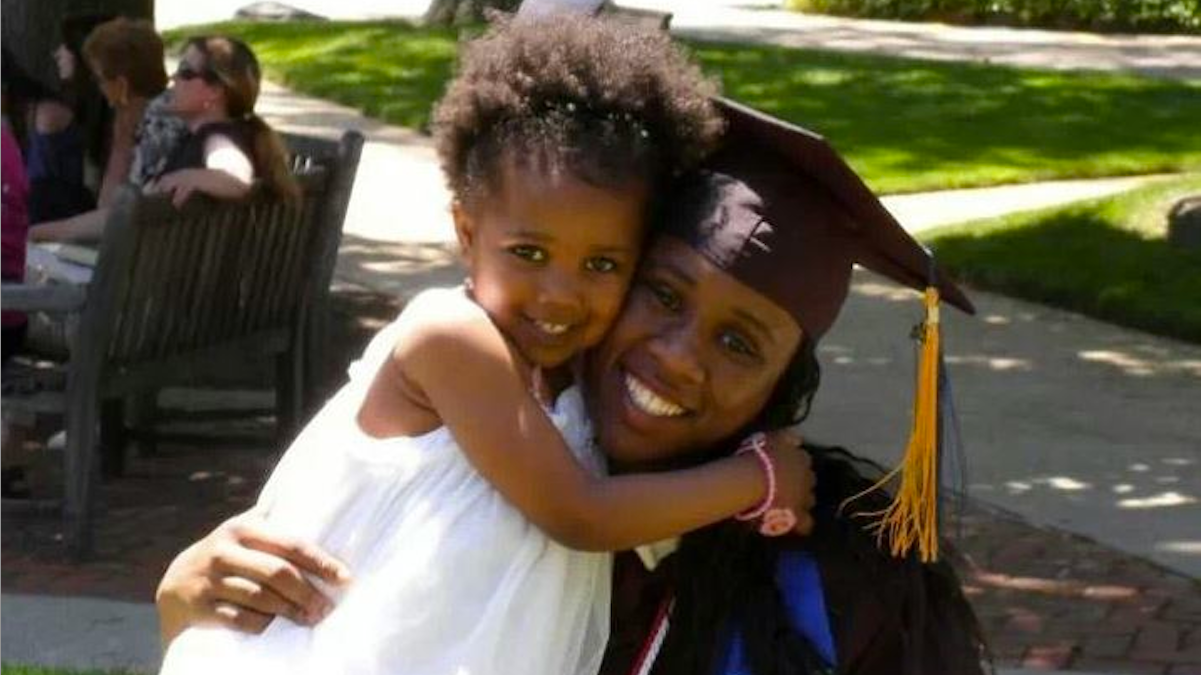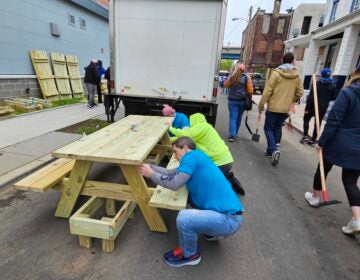Facing long waits for day care subsidies in Philadelphia

Queen Muse and daughter Aniyah in 2012 when Muse got her undergraduate degree from La Salle University. (Photo courtesy of Germantown Beat)
This is the second story of a four-part Germantown Beat series on the “child-care crisis in Philadelphia.”
When the alarm goes off in her West Oak Lane apartment at 7 a.m., Queen Muse has one thing on her mind – getting her daughter up, dressed, fed and out the door. But there’s never any set plan for where Aniyah, 4, will spend her day.
Muse, a single mother who earns $137 a week at her part-time job, qualifies for a government subsidy to enroll Aniyah at a day care center. But since last July, she’s been on a waiting list for subsidized care, forcing her to improvise. (Ed. note: Muse has written for NewsWorks in the past.)
Some days, Muse climbs into her black Jeep Cherokee and drops her daughter off at the home of her sister-in-law. Other days, she takes her to Younger Days, a center on North Broad Street near Chelten Avenue.
Muse’s mother, who is disabled, makes sacrifices to help foot the bill so her granddaughter can have part-time day care.
“My mom, when she can, pays for weeks and spurts of weeks where three days out of the week she can go to the day care,” Muse said. “She will pay straight out of pocket, which is very expensive.”
Two-thirds miss out on subsidy
Muse’s situation is not unusual.
Two-thirds of all children in Philadelphia live in families that are eligible to receive child-care subsidy, but only about 33 percent actually receive it, according to a recent report by the city’s Office of Community Empowerment and Opportunity.
The report, titled Shared Prosperity Philadelphia and touted by Mayor Michael Nutter, is the city’s first comprehensive anti-poverty plan since the 1960s. Among other issues, it puts a spotlight on the need for access to affordable, quality day care for low-income city residents.
While some eligible families don’t know about — or don’t bother to apply for — subsidized day care, hundreds of others qualify based on their limited income but face waiting lists since there’s not enough money to meet demand.
Government funding falls short
Currently, Philadelphia spends about $300 million a year, most of it federal funds, to subsidize day care and other early childhood education for the poor. But the need for care is growing as more and more city residents fall into poverty.
“There’s always been a waiting list,” explained Shirley P. Thomas, director of the Northwest Philadelphia office of Child Care Information Services (CCIS), a state agency operated by The Urban League of Philadelphia that processes applications for subsidized child care.
Currently, Thomas said, about 300 families served by the Northwest office are on the waiting list, and the average wait is six months. Others report much longer waits.
“We have parents who’ve been on the wait list for a year,” said Khadijah Sabir, public policy coordinator for the Delaware Valley Association for the Education of Young Children (DVAEYC), an advocacy group. “A lot of parents can’t pay, so they choose to keep their kids home.”
Staying at home not option
Staying at home with Aniyah is not an option for Muse, who is juggling both work and graduate school as she tries to launch a career in journalism, a field that is shedding jobs, not creating them.
Even with notable clips from her college newspaper and a student internship at the White House, Muse was unable to find a full-time journalism job in Philadelphia. She now works as a part-time reporter at NBC10, a NewsWorks content partner.
To make herself more marketable, she is also taking graduate classes in communication at La Salle University.
While she waits for a day-care slot to open up, Muse often calls on her large, extended family for help with Aniyah.
“I have a really big family and they are a great support system to me,” she said. “My brother lives next door to me and he has two young sons. When I can’t watch her, they are open to watch her depending on their schedule. I rely on my family very heavily.”
Muse is frustrated that the government cannot deliver on its promise of day care when she qualifies for, and needs, it.
“Other women cannot get through that waiting period,” she said. “Other people don’t have what I have, and you have to acknowledge and think about that.”
On Dec. 23, 2013, Muse received a notice from CCIS saying she would be ineligible for day care subsidy beginning Jan. 1 because she had not responded to an approval notice within 30 days. Muse said she never received such a notice. She is now appealing.
Andrew Albert is a La Salle University student who writes for GermantownBeat, a local student-produced news site. NewsWorks features articles from GermantownBeat on its Northwest Philadelphia community sites and contributes multimedia journalism training to the program. Jovan Alford, Ariana Davis and Michael Kelly also contributed reporting for this story.
WHYY is your source for fact-based, in-depth journalism and information. As a nonprofit organization, we rely on financial support from readers like you. Please give today.




